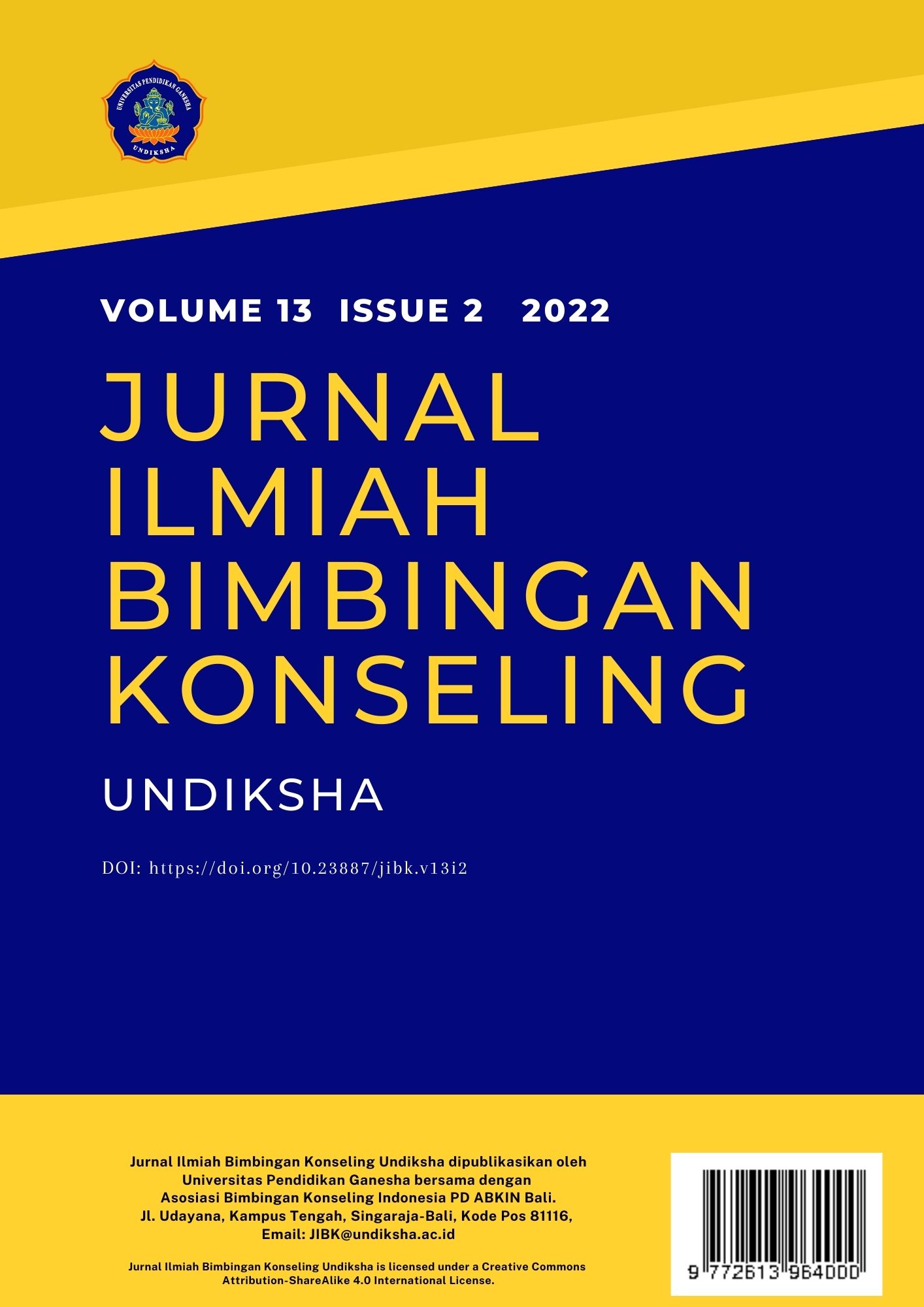Ilmu dan Jiwa atau Ruh Dalam Psikologi Bimbingan dan Konseling
DOI:
https://doi.org/10.23887/jibk.v13i2.33521Keywords:
Sains, Jiwa, Psikologi, KonselingAbstract
Psychology, which is the science of life force. Namely the science that studies human behavior in relation to the environment. As part of science, psychology has come a relatively long way. The interesting thing about human studies is inseparable from the most basic aspects of existence and life, namely creatures that have to learn and undergo the learning process. Humans learn to be able to live an effective daily life (KES) and avoid interrupted daily effective life (KES-T). Allah created man by providing all possibilities through His various dispositions as the most perfect and highest-ranking creature among various creatures, in studying the authenticity of man whose condition crosses and overcomes the laws of cause and effect and the study of the development and dynamics of human behavior and culture in the world.
Abstrak:
Psikologi, yaitu ilmu tentang kekuatan hidup. Yaitu ilmu yang mempelajari perilaku manusia dalam hubungannya dengan lingkungan. Sebagai bagian dari sains, psikologi telah berkembang cukup jauh. Hal yang menarik tentang kajian manusia tidak terlepas dari aspek yang paling mendasar dari keberadaan dan kehidupan, yaitu makhluk yang harus belajar dan menjalani proses belajar. Manusia belajar untuk dapat menjalani kehidupan sehari-hari yang efektif (KES) dan menghindari kehidupan efektif sehari-hari yang terputus (KES-T). Allah menciptakan manusia dengan menyediakan segala kemungkinan melalui berbagai fitrah-Nya sebagai makhluk yang paling sempurna dan tertinggi di antara berbagai makhluk, dalam mempelajari otentisitas manusia yang kondisinya melintasi dan mengatasi hukum sebab akibat dan mempelajari perkembangan dan dinamika kehidupan. perilaku dan budaya manusia di dunia.
References
Departemen Agama RI. (1984). Alqur’an dan Terjemahanya. Toha Putera.
Hasbi, M. (2016). Konsep Jiwa dan Pengaruhnya dalam Kepribadian Manusia. Studi Tafsir Al-Misbah Karya Quraish Shihab, Vol. 17 no. DOI: https://doi.org/10.14421/qh.2016.1701-03
Mualimin. (2017). Konsep Fitrah Manusia dan Implikasinya dalam Pendidikan Islam. Jurnal Pendidikan Islam : Al-Tadziyyah, Vol 8 no 1. DOI: https://doi.org/10.24042/atjpi.v8i2.2130
Oktaviani, R. (2020). Penciptaan Manusia Dalam Perspektif Al-Qur’an Dan Sains. Jurnal Islam Dan Sains, 2(01), 1–12. DOI: https://doi.org/10.31219/osf.io/95d7y
Pransiska, T. (2017). Konsepsi Fitrah Manusia Dalam Perspektif Islam Dan Implikasinya Dalam Pendidikan Islam Kontemporer. Jurnal Ilmiah Didaktika, 17(1), 1. https://doi.org/10.22373/jid.v17i1.1586 DOI: https://doi.org/10.22373/jid.v17i1.1586
Prayitno. 2017. Konseling Profesional Yang Berhasil. Padang: Rajawali Pers
Prayitno. Marjohan. (2015). Pelayanan Profesional Konseling yang Berhasil. Universitas Negeri Padang.
Prayitno. (2020). Kehidupan Manusia. Gerakan Nasionalis Nusantara Genastara.
Samad, S. A. A. (2015). Konsep Ruh dalam Perspektif Psikologi Pendidikan Barat dan Islam. Fenomena, 7(2), 221. https://doi.org/10.21093/fj.v7i2.300 DOI: https://doi.org/10.21093/fj.v7i2.300
Saryono. (2016). Konsep Fitrah dalam Perspektif Islam. Jurnal Studi Islam : Medina-Te, Vol 14 no.
Downloads
Published
Issue
Section
License
Copyright (c) 2022 Alfun Sandi

This work is licensed under a Creative Commons Attribution 4.0 International License.
Jurnal Ilmiah Bimbingan Konseling Undiksha is an Open Access Journal. The authors who publish the manuscript in this journal agree to the following terms:
JIBK is licensed under a Creative Commons Attribution 4.0 International License. This permits anyone to copy, redistribute, remix, transmit and adapt the work provided the original work and source is appropriately cited.
This means:
Jurnal Ilmiah Bimbingan Konseling is licensed under a Creative Commons Attribution 4.0 International License.
(1) Under the CC-BY license, authors retain ownership of the copyright for their article, but authors grant others permission to use the content of publications in JIBK in whole or in part provided that the original work is properly cited. Users (redistributors) of JIBK are required to cite the original source, including the author's names, JIBK as the initial source of publication, year of publication, volume number, issue, and Digital Object Identifier (DOI); (2) The authors are the copyright owner of the article, and the author grants the JIBK held the first publication right.









.png)

.jpg)
